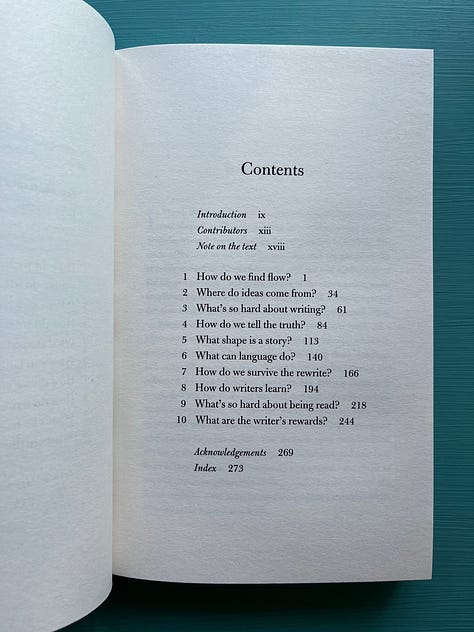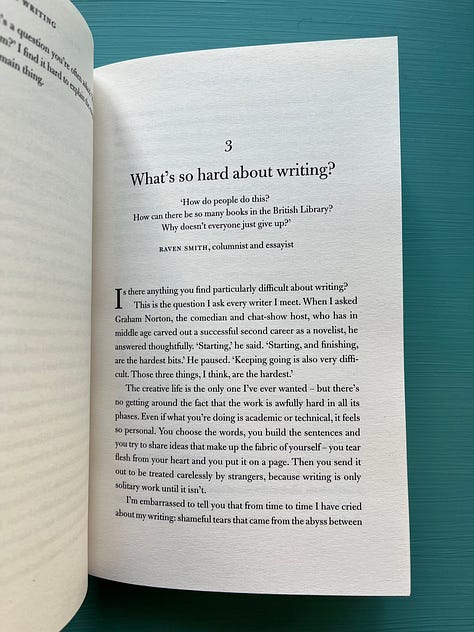Did I write this?
Plus some live events this autumn, and a writing hour this Sunday.
Paying subscribers can hear me read this aloud, here or on any podcast app.
I’m doing a Creative Hour this Sunday 22 September – I hope you’ll join me for some writing at 5pm UK time (timezone converter here). Full subscribers will receive a link on Sunday morning.
How’s your writing going at the moment? Are you enjoying progress on something, or trying to persevere through a sticky bit? Let’s chat about your latest successes, trials and tribulations in the comments!
Last week, the first proper copy of my book arrived at my flat – just one for now, like a prototype.
It’s on my desk, and I keep seeing it there and being surprised. It’s lovely, but where did it come from? I feel like I wrote it such a long time ago. There’s a feeling of detachment and strangeness that I didn’t expect, but it’s still a joy. This week I interviewed a novelist (for the podcast – coming very soon) who told me that when his book came out and was wildly acclaimed, he kept thinking, ‘I wish I could tell the me who wrote the book.’
One good thing about having a bit of distance from it is that I’m able to see more clearly what the book is about, which is not just the nuts and bolts of writing. It is about all of that stuff, but to me it’s just as much about how risky it can feel to connect honestly with people, and how worthwhile it is to keep trying. It’s about building the courage and resilience to put yourself out there, cope with other people’s opinions, and accept and recover from failures – all of which are great skills for a writer, and for every other human too.



Here’s what the chapters are about:
How do we find flow?
How do writers get out of their own way to be productive, despite all the distractions, emotional wobbles and life problems that interrupt? This chapter has practical stuff that works for some and might work for you.Where do ideas come from?
This chapter is largely drawn from new interviews that I did exclusively for the book, and I really love it. It’s about what it means and feels like to have an idea, and how to cultivate them and get started.What’s so hard about writing?
This one is about all the days when you wonder why you’re writing at all, and you want to bang your head against the desk. It’s very comforting to discover that the most successful writers in the world also have meltdowns of self-doubt and stress (and learn to cope with them).
How do we tell the truth?
This is another favourite. All good writing, regardless of whether it’s factual, feels true – that’s why it touches and resonates with readers (or audiences). So how do we give it that feeling?What shape is a story?
This one is about structure, one of the most difficult elements of writing. What can the best writers tell us about how they approach the structure of a novel, or short story, or article?
What can language do?
I did some great new interviews for this chapter too. Language is something we don’t talk about very often in the creative-writing world, which is strange, since words are the only thing we have to work with.How do we survive the rewrite?
This chapter is full of good practical advice about editing, rewriting and improving a piece of work. I think we can all benefit from that because, let’s face it, this part of the job can be an endurance test.
How do writers learn?
There’s information in this chapter about the obvious things, like creative writing courses, but also other kinds of experiences that novelists, screenwriters and poets have found transformative to their work.What’s so hard about being read?
This is about the challenging stuff that can come after the writing – like rejections, and idiotic Amazon reviews, and possibly not loving your own published work – or even just the fear that you might encounter some of those things. The comforting thing about this chapter is that everyone has survived to tell the tale.
What are the writer’s rewards?
This one is about the reasons why people keep doing it, and loving it, despite all the difficulties described above. A very heartwarming chapter.
The book is out on 7 November. If you’re planning to buy it, either for yourself or maybe as a Christmas gift, I would be very happy if you’d consider pre-ordering it, as pre-orders make a big difference to how the book fares in the world. You could do that online (there’s a link to Amazon below, but any bookselling website works), or you could pop into your local bookshop and ask them to order a copy for you. That’s also very helpful, because it makes the bookseller aware there’s interest, and then they might look into stocking it, which would bring it to the attention of more potential readers.
You could also (cheaper option) ask your library to get a copy so that you can borrow it! I’d be delighted with that.
I’m doing some live events this autumn – some directly to talk about my book, and others to interview other writers about their books.
17 October: Interviewing Patrick Grant about his book Less at Guildford Book Festival
26 October: In conversation about writing with Anna Metcalfe and Julia Wheeler at Stratford upon Avon Literary Festival
10 November: In conversation about writing with Maggie O’Farrell for Rare Birds Books in Edinburgh
23 November: Interviewing David Nicholls about his novel You Are Here and his writing process at Cambridge Literary Festival
30 November: Being interviewed by Anna Metcalfe at Heath Bookshop, Birmingham
There will also be some online events, and I’ll keep you posted on those.
Looking forward to seeing some of you on Sunday! Until then, good luck with your writing.




It's so special getting that prototype! Congratulations! The cover and the blurb are fantastic. The chapter sound brilliant - have pre-ordered and can't wait to read it.
I’ve ordered a copy from my local bookshop. Looking forward to reading it.